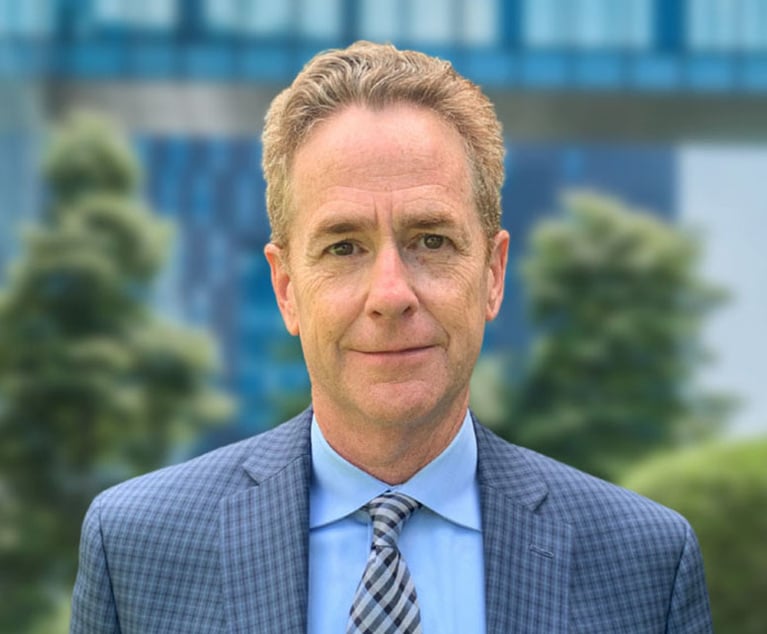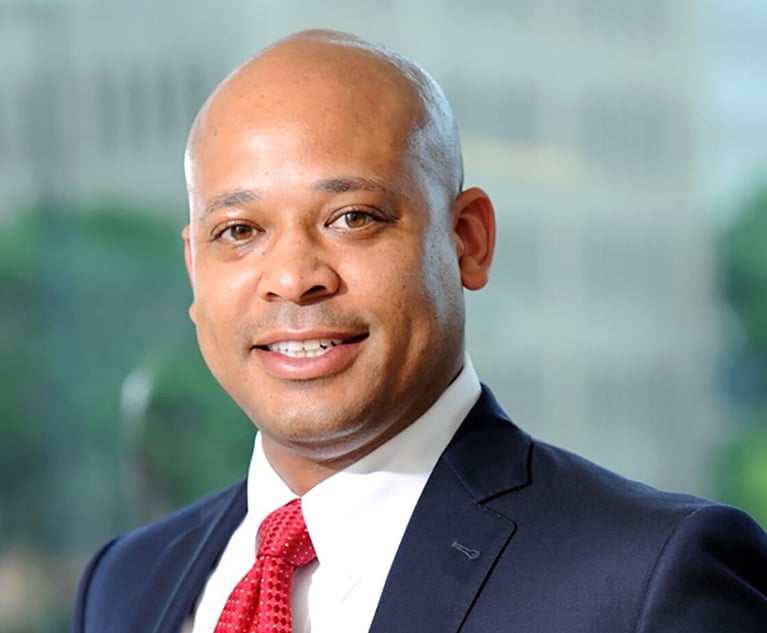 Robert Mercer, Mercer Law, Atlanta. (Courtesy photo)
Robert Mercer, Mercer Law, Atlanta. (Courtesy photo)COVID-19 Crisis Prompts a Refresher on Georgia Insolvency Law
Lawyers may unknowingly advise clients to take actions that violate insolvency law, potentially exposing their clients and themselves to liability.
July 28, 2020 at 01:25 PM
6 minute read
Given the COVID-19 pandemic's effect on the economy, it is a good time for lawyers to brush up on Georgia insolvency law. Insolvency law can be challenging because it is often counterintuitive to lawyers whose practice does not focus on insolvency. As a result, lawyers may unknowingly advise clients to take actions that violate insolvency law, potentially exposing their clients and themselves to liability.
In the hypothetical below, a lawyer advises a director and officer, or D&O, of an insolvent Georgia corporation to use such corporation's remaining cash to pay a debt owed to the D&O as well as the D&O's guaranteed debt. The lawyer advises the client thereafter to make a 14-cent pro rata distribution to the corporation's remaining creditors.
While such advice may seem innocuous to many lawyers, it will most likely expose the client to liability under Georgia's trust fund doctrine and fraudulent concealment liability.
This article is the first in a two-part series. The next article will discuss potential lawyer liability and loss of privilege resulting from such advice. Note: the names of the individuals and businesses and the events set forth below are fictional.
Plummeting Revenues
One morning, Anne, a leading Atlanta corporate finance lawyer, gets a call from one of her longtime clients, Bob. Anne has represented Bob, a well-known Atlanta entrepreneur, and his entities for more than 30 years.
Bob is calling about Close-Contact Events Inc., a corporation organized under Georgia law. Bob is the president and sole member of the board of directors of Close-Contact.
Given the length of the relationship, Anne takes a relaxed approach to sending engagement letters. As a result, Anne does not send any engagement letter in connection with advising Bob on the call or the related work she does because of it.
Bob tells Anne that, because of the pandemic, the revenues of Close-Contact have plummeted, causing it to fall behind in its payments to creditors.
Bob further tells Anne that the chief financial officer of Drinks and Snacks Inc. Drinks, a concessions company, told Bob it plans to sue him on his personal guaranty unless he brings Drinks current on $3.5 million of outstanding invoices.
Bob informs Anne that Close-Contact is insolvent and not going to survive unless he invests substantially more of his personal funds, which he is unwilling to do. Close-Contact has $11.5 million of cash along with various personal property of de minimis value and $54.5 million of unsecured debt. Bob complains that, on top of his guaranty liability, Close-Contact owes him $1 million on account of an officer loan.
Anne advises Bob to use the remaining cash to cause Close-Contact to pay $3.5 million to Drinks and $1 million to himself. Bob follows Anne's advice and makes such wire transfers, leaving Close-Contact with $7 million in cash.
Purported Pro Rata Distribution to Remaining Creditors
Anne prepared a letter, which Bob signed and sent, to the remaining creditors of Close-Contact. The letter informs the creditors that Close-Contact is going out of business but will be paying each of them 14 cents on the dollar. Such creditors collectively hold $50 million in unsecured claims.
The letter states that Close-Contact only has $7 million of remaining cash and that it will pay each of them their pro rata share.
The letter does not mention, however, the $1 million payment to Bob or the $3.5 million payment to Drinks, which eliminated Bob's guaranty liability.
Each creditor accepts the 14 cents on the dollar distribution.
Litigious Creditor Threatens to Sue
A credit manager for one of the creditors, Litigious Creditor Inc., subsequently becomes incensed when one of his friends who works for Drinks tells him that they got paid in full by Close-Contact because Bob had guaranteed such debt.
Litigious Creditor threatens to sue not only Close-Contact but also Bob personally.
Georgia's Trust Fund Doctrine: The Fiduciary Duty of D&Os to Creditors
Under Georgia's trust fund doctrine, Bob may have liability to Litigious Creditor.
As background, under such doctrine, "when a corporation becomes insolvent," its directors and officers are "bound to manage the remaining assets for the benefit of its creditors." Hickman v. Hyzer, 401 S.E.2d 738, 749 (Ga. 1991); see also Ware v. Rankin, 104 S.E.2d 555, 558 (Ga. Ct. App. 1958) (trust fund doctrine also applies to officers).
In the context of an insolvent corporation, the trust fund doctrine prohibits, among other things, not only the payment of the debt of a D&O but also D&O guaranteed debt. Ware, 104 S.E.2d at 559.
Under these circumstances, there is a strong argument that both Bob's payment on his guaranteed debt and his payment to himself violate Georgia's trust fund doctrine. As a result, Litigious Creditor may be able to "set aside" both the $3.5 million payment to Drinks and the $1 million payment to Bob and seek a judgment from Bob for both amounts. Georgia Commercial Stores, Inc. v. Forsman, 803 S.E.2d 805, 810 (Ga. Ct. App. 2017).
Fraudulent Concealment
Because of Georgia's trust fund doctrine and the insolvency of Close-Contact, Bob probably has a fiduciary duty to creditors. As a result of such duty, Bob probably has a duty to make a complete—rather than a selective and self-serving—disclosure to creditors. Wright v. Apartment Invest. & Mgmt. Co., 726 S.E.2d 779, 787 (Ga. Ct. App. 2012).
Bob's letter to creditors neither mentions his $1 million payment to himself nor his $3.5 million payment to Drinks because of his personal guaranty. Such omissions may constitute fraudulent concealment. See also Forsman, 803 S.E.2d at n.7 (implying that a managing member might have fraudulent concealment liability because his letter to a creditor fails to disclose a payment to a member).
Key Takeaway
It is easy to see how Anne could believe that there was nothing wrong with Bob paying himself and his guaranteed debt ahead of other creditors. After all, both are bona fide debts, and Georgia law is very clear that a "debtor may prefer one creditor over another." O.C.G.A. § 18-2-40. But Georgia law is equally clear that the foregoing statement does not necessarily apply when D&Os are involved. Hodge v. Howes, 578 S.E.2d 904, 907 (Ga. Ct. App. 2003).
As a result of Anne not knowing about Georgia's trust fund doctrine, she gives Bob advice exposing him to liability. In the second article, we will see that Anne's advice will not only put the attorney-client privilege at risk but will also expose her to significant liability.
Robert Mercer is the founder of Mercer Law, a boutique law firm in Atlanta that focuses on high-stakes bankruptcy and insolvency engagements. This article is for general information purposes and is not intended to be and should not be taken as legal advice.
This content has been archived. It is available through our partners, LexisNexis® and Bloomberg Law.
To view this content, please continue to their sites.
Not a Lexis Subscriber?
Subscribe Now
Not a Bloomberg Law Subscriber?
Subscribe Now
NOT FOR REPRINT
© 2024 ALM Global, LLC, All Rights Reserved. Request academic re-use from www.copyright.com. All other uses, submit a request to [email protected]. For more information visit Asset & Logo Licensing.
You Might Like
View All
Business Breakups: Why Business and Commercial Cases Are Well-Suited to Mediation
5 minute read

In RE: Hair Relaxer Marketing, Sales Practices and Products Liability Litigation
Trending Stories
- 1Gibson Dunn Sued By Crypto Client After Lateral Hire Causes Conflict of Interest
- 2Trump's Solicitor General Expected to 'Flip' Prelogar's Positions at Supreme Court
- 3Pharmacy Lawyers See Promise in NY Regulator's Curbs on PBM Industry
- 4Outgoing USPTO Director Kathi Vidal: ‘We All Want the Country to Be in a Better Place’
- 5Supreme Court Will Review Constitutionality Of FCC's Universal Service Fund
Who Got The Work
Michael G. Bongiorno, Andrew Scott Dulberg and Elizabeth E. Driscoll from Wilmer Cutler Pickering Hale and Dorr have stepped in to represent Symbotic Inc., an A.I.-enabled technology platform that focuses on increasing supply chain efficiency, and other defendants in a pending shareholder derivative lawsuit. The case, filed Oct. 2 in Massachusetts District Court by the Brown Law Firm on behalf of Stephen Austen, accuses certain officers and directors of misleading investors in regard to Symbotic's potential for margin growth by failing to disclose that the company was not equipped to timely deploy its systems or manage expenses through project delays. The case, assigned to U.S. District Judge Nathaniel M. Gorton, is 1:24-cv-12522, Austen v. Cohen et al.
Who Got The Work
Edmund Polubinski and Marie Killmond of Davis Polk & Wardwell have entered appearances for data platform software development company MongoDB and other defendants in a pending shareholder derivative lawsuit. The action, filed Oct. 7 in New York Southern District Court by the Brown Law Firm, accuses the company's directors and/or officers of falsely expressing confidence in the company’s restructuring of its sales incentive plan and downplaying the severity of decreases in its upfront commitments. The case is 1:24-cv-07594, Roy v. Ittycheria et al.
Who Got The Work
Amy O. Bruchs and Kurt F. Ellison of Michael Best & Friedrich have entered appearances for Epic Systems Corp. in a pending employment discrimination lawsuit. The suit was filed Sept. 7 in Wisconsin Western District Court by Levine Eisberner LLC and Siri & Glimstad on behalf of a project manager who claims that he was wrongfully terminated after applying for a religious exemption to the defendant's COVID-19 vaccine mandate. The case, assigned to U.S. Magistrate Judge Anita Marie Boor, is 3:24-cv-00630, Secker, Nathan v. Epic Systems Corporation.
Who Got The Work
David X. Sullivan, Thomas J. Finn and Gregory A. Hall from McCarter & English have entered appearances for Sunrun Installation Services in a pending civil rights lawsuit. The complaint was filed Sept. 4 in Connecticut District Court by attorney Robert M. Berke on behalf of former employee George Edward Steins, who was arrested and charged with employing an unregistered home improvement salesperson. The complaint alleges that had Sunrun informed the Connecticut Department of Consumer Protection that the plaintiff's employment had ended in 2017 and that he no longer held Sunrun's home improvement contractor license, he would not have been hit with charges, which were dismissed in May 2024. The case, assigned to U.S. District Judge Jeffrey A. Meyer, is 3:24-cv-01423, Steins v. Sunrun, Inc. et al.
Who Got The Work
Greenberg Traurig shareholder Joshua L. Raskin has entered an appearance for boohoo.com UK Ltd. in a pending patent infringement lawsuit. The suit, filed Sept. 3 in Texas Eastern District Court by Rozier Hardt McDonough on behalf of Alto Dynamics, asserts five patents related to an online shopping platform. The case, assigned to U.S. District Judge Rodney Gilstrap, is 2:24-cv-00719, Alto Dynamics, LLC v. boohoo.com UK Limited.
Featured Firms
Law Offices of Gary Martin Hays & Associates, P.C.
(470) 294-1674
Law Offices of Mark E. Salomone
(857) 444-6468
Smith & Hassler
(713) 739-1250







